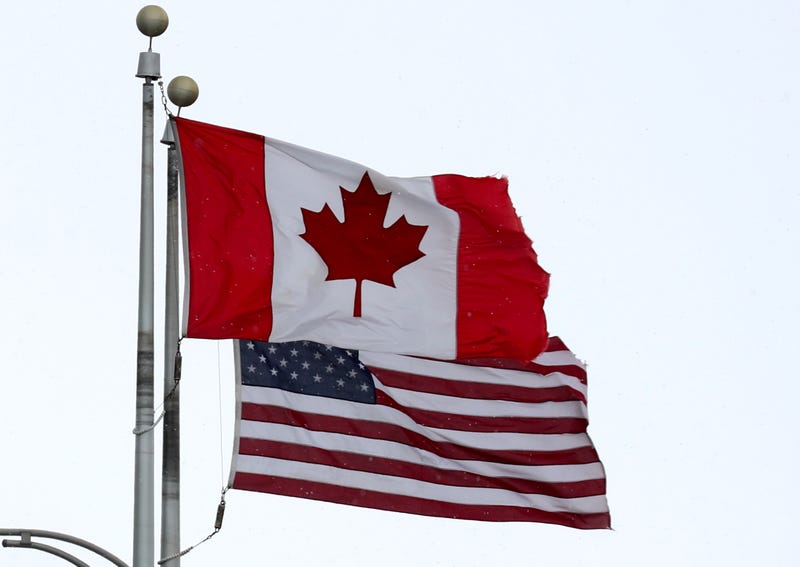
Buffalo, N.Y. (WBEN) - A trade war is now underway after the Trump administration in Washington, D.C. imposed tariffs his three biggest trading partners in Mexico, China and Canada early Tuesday morning.
These tariffs immediately drew retaliatory tariffs on the United States, sending financial markets into a tailspin and forcing the U.S. to potentially face the threat of rekindled inflation and paralyzing uncertainty for business.
U.S. President Donald Trump imposed 25% tariffs, or taxes, on Mexican and Canadian imports, though he limited the levy to 10% on Canadian energy. Trump also doubled the tariff he slapped last month on Chinese products to 20%.
Canadian Prime Minister Justin Trudeau responded by saying his country would plaster tariffs on over $100 billion of American goods over the course of 21 days.
For local leaders on both sides of the U.S.-Canada border, the sentiment over this trade war is one of disappointment, feeling all of this is completely unnecessary.
"This is going to have a tremendously negative impact on our community, which relies so much on cross-border traffic. This is not something that anyone had hoped for," said Erie County Executive Mark Poloncarz in an interview with WBEN. "I don't believe there's going to be any winners in this trade war, and there's going to be losers, and that's the consumers on both sides of the border as prices for all sorts of goods, whether it's food products to timber products and automobiles, all go up because of a completely unnecessary decision by the President to implement these tariffs, and the corresponding tariffs from the Canadians."
"In a trade war, tariffs do nothing but ruin people's lives. They raise prices, they impact inflation, and people lose jobs," added Niagara Falls, Ontario Mayor Jim Diodati with WBEN. "I'm very hopeful that we can get everybody back together at the table, and have a real serious negotiation between Canada, the U.S. and Mexico."
Despite the tariffs, the goal for leaders in Western New York and Southern Ontario continues to surround the idea of working together to try to possibly lessen the impact of tariffs or, at the very least, keep relations strong between the communities surrounding the border.
"I firmly believe it all comes down to relationships and your network. We've got very warm, long historied relations along this great border of ours between these wonderful nations," Diodati said. "I can tell you, I work very closely with many mayors along the border, Congressmen, Senators, county executives, all sorts of people for many years. And before that, for 25 years, I was in business for myself, doing a lot of international back-and-forth. And I can tell you, in Canada, we love Americans, we love the USA. And we know this is not a problem between the people, it's a problem between the leaders and the negotiations. So we see past it, and we're hopeful that calmer heads will prevail, and they'll realize the high tide is going to bring up all boats."
Diodati adds that whenever tariffs are brought into the equation, there is never a winner in such a war.
For Poloncarz, his conversations will continue with leaders across the border in efforts to continue a positive relationship during this unnecessary trade war. This includes conversations with Mayor Diodati.
"I know our American officials, regardless of political party, feel the same way, the Canadians feel the same way. You'll be hearing more about it very soon, but we're going to be united in our efforts to remind everybody that while we are two great, strong, independent nations, our economies are so dependent upon each other, a trade war benefits no one," Poloncarz said.
"This past week, I've also been in Washington, D.C., and last night I was at the Embassy of Canada, meeting with Canadian economic officials in the United States, including their chargé d'affaires for economic development and their minister who deals with Congress and the administration. They all agree that this is completely unnecessary, and that unfortunately, the border regions are going to get hurt more than other areas, at least initially on, because of the direct impact. All areas of both countries are eventually going to feel the pain. It's just going take a little longer when it finally transitions to the cost of goods."
In the end, both Diodati and Poloncarz know this trade war and tariffs implemented will hurt the communities closest to the U.S.-Canada the most in the early stages.
"Nobody wins. Everybody loses. Everybody loses buying power. So I'm hopeful that more than 200 years of history between our great nations, along the world's longest unmilitarized border, which has always been a beacon as a great example of how nations get along and help each other in bad times and in good times," Diodati said. "I believe at the end of the day, we're going to look at all the tools in the toolbox, all the years of relations, and figure out what's best for everybody. And certainly going down this route is not a good idea for either side of the border."
"I think the President is hoping that most Americans will not feel the pain, at least initially, but that's a bad decision, because that means he's hurting us in Western New York under the hope that others don't get hurt as bad," Poloncarz added. "People on both sides of the border, regardless of whether they're Democrats or Republicans in the United States or liberals and conservatives in Canada, all agree that we're just all going to get hurt by this.
"Leaders on both sides of the border know that, I'm hoping that the President eventually realizes it, and that cooler heads will prevail and remove these tariffs, because they're just silly."

